
Malayalam cinema is the segment of Indian cinema dedicated to the production of motion pictures in the Malayalam language, which is widely spoken in the state of Kerala and Lakshadweep islands of india. Malayalam cinema includes the commercial film industry, sometimes known as Mollywood, as well as independent cinema made in Malayalam.

Girish Kasaravalli is an Indian film director, in the Kannada cinema, and one of the pioneers of the Parallel Cinema. Known internationally for his works, Kasaravalli has garnered fourteen National Film Awards, including four Best Feature Films; Ghatashraddha (1977), Tabarana Kathe (1986), Thaayi Saheba (1997) and Dweepa (2002). In 2011, he was awarded with the Padma Shri, the fourth highest civilian award by Government of India.

Adoor Gopalakrishnan is an Indian film director, script writer, and producer and is regarded as one of the most notable and renowned filmmakers in India. With the release of his first feature film Swayamvaram (1972), Gopalakrishnan pioneered the new wave in Malayalam cinema during the 1970s. In a career spanning over five decades, Gopalakrishnan has made only 12 feature films to date. His films are made in the Malayalam language and often depict the society and culture of his native state Kerala. Nearly all of his films premiered at Venice, Cannes and Toronto International Film Festival. Along with Satyajit Ray and Mrinal Sen, Gopalakrishnan is one of the most recognized Indian film directors in world cinema.

Elippathayam is a 1982 Malayalam film written and directed by Adoor Gopalakrishnan. It stars Karamana Janardanan Nair, Sharada, Jalaja, and Rajam K. Nair. The film documents the feudal life in Kerala at its twilight overshadowed with grief, and a sense of carelessness/avoidance as a form of revolt. The protagonist is disenfranchised and trapped within himself and does not want to - unable to change with the social changes taking place around him. The film premiered at the 1982 Cannes Film Festival. It was also screened at the London Film Festival where it won the Sutherland Trophy. It is widely regarded as one of the best Indian films ever made.
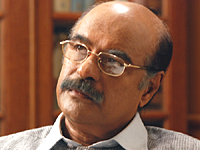
Gopynathan Velayudhan Nair, popularly known by the stage name Bharat Gopy, was an Indian actor, producer, and director. Considered one of the greatest actors in the history of Indian cinema, Gopy was one of the first actors to be associated with the New Wave cinema movement in Kerala during the 1970s.
Parallel cinema, or New Indian Cinema, is a film movement in Indian cinema that originated in the state of West Bengal in the 1950s as an alternative to the mainstream commercial Indian cinema.

Swayamvaram is a 1972 Indian Malayalam-language drama film co-written and directed by Adoor Gopalakrishnan, starring Madhu and Sharada in the lead roles. Notable smaller roles were played by Thikkurisi Sukumaran Nair, Adoor Bhavani, K. P. A. C. Lalitha, and Bharath Gopi. The film depicts the life of a couple—Vishwam (Madhu) and Sita (Sharada)—who have married against their parents' wishes and want to start a new life at a new place. The title is an allusion to the ancient Indian practice of a girl of marriageable age choosing a husband from among a list of suitors.
Vidheyan is a 1994 Indian Malayalam-language drama film directed and written by Adoor Gopalakrishnan. It is based on the novella Bhaskara Pattelarum Ente Jeevithavum by Paul Zacharia. The film, starring Mammootty and M. R. Gopakumar, explores the master-slave relationship in a South Karnataka setting.
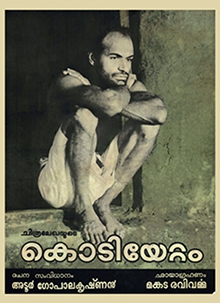
Kodiyettam is a Malayalam-language film written and directed by Adoor Gopalakrishnan. The film stars Bharat Gopy in the lead role. Notable smaller roles were played by K. P. A. C. Lalitha, Kuttyedathi Vilasini, Azeez and Adoor Bhawani. The film depicts the life of Shankaran Kutty, a carefree simpleton who eventually rises to be a mature, responsible adult. The title of the film translates to 'Ascent' which symbolizes the growth of Shankaran Kutty.

Anantaram, also known as Monologue, is a 1987 Indian Malayalam-language film produced, written and directed by Adoor Gopalakrishnan. It stars Mammootty, Ashokan and Shobhana in the lead. The film is structured like a monologue. It develops through a commentary by the protagonist about himself in the first person. The attempt of the protagonist is to narrate how his undiagnosed psychosis led him where he is now. The film was an experimental film for its time as it did not have a linear narrative.
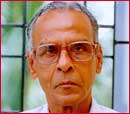
Mankada Ravi Varma was an Indian cinematographer and director who worked in Malayalam cinema. He is exclusively known for his association with renowned film-maker Adoor Gopalakrishnan. He has associated with other major directors such as G. Aravindan and P. N. Menon. He has also directed two films. He has won two National Film Awards and seven Kerala State Film Awards in various categories. In 2006, he was honoured with the J. C. Daniel Award, Kerala government's highest honour for contributions to Malayalam cinema.

Mathilukal (transl. Walls) is a 1990 Indian Malayalam-language film written, directed, and produced by Adoor Gopalakrishnan based on the autobiographical novel of the same name by Vaikom Muhammad Basheer. The film focuses on the prison life of Vaikom Muhammad Basheer and the love between him and Narayani, a female inmate of the prison, who remains unseen throughout the film. Mammootty plays the role of Vaikom Muhammad Basheer while K. P. A. C. Lalitha gives voice to Narayani. The film was screened at the Venice Film Festival.

Celluloid Man is a 2012 documentary film directed by Shivendra Singh Dungarpur that explores the life and work of legendary Indian archivist P. K. Nair, founder of the National Film Archive of India and guardian of Indian cinema.
Kodumudikal is a 1981 Indian Malayalam film, directed by J. Sasikumar and produced by K. K. Nambiar. The film stars Prem Nazir, Jayabharathi, Adoor Bhasi and Kanakadurga in the lead roles. The film has musical score by M. K. Arjunan.
Raajavembaala is a 1984 Indian Malayalam film, directed and produced by K. S. Gopalakrishnan. The film stars Ratheesh, Kalaranjini, Anuradha and Balan K. Nair in the lead roles. The film has a musical score by K. J. Joy.
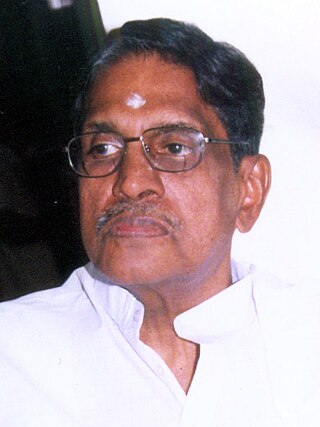
Krishna Ravindranathan Nair , also known as Achani Ravi or General Pictures Ravi, was an Indian film producer of Malayalam films, industrialist and philanthropist. He was known for a number of critically acclaimed films he produced, such as Kanchana Sita, Thampu, Kummatty, Esthappan, Pokkuveyil, Elippathayam, Manju, Mukhamukham, Anantaram and Vidheyan. Nair was credited with fostering the art film movement in Malayalam cinema during the period from the 1970s to the 1990s. A multiple recipient of National and State film awards, Nair was awarded the J. C. Daniel Award by the Government of Kerala, in 2008, for his contributions to Malayalam cinema.
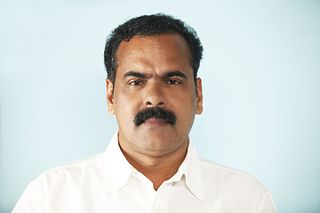
Mohan Kupleri (Malayalam: മോഹൻ കുപ്ലേരി; born 19 June 1957) is an Indian film director in Malayalam cinema, Television Serials and Advertising Films. He made his debut cinema with Grihaprevesam (1992). His films include Nandini Oppol (1994), Kaathil Oru Kinnaram (1996), Dravidan (1998), Kattathoru Penpoovu (1998), Saavithriyude Aranjaanam (2002), Payum Puli (2007), Evadaina Sare (2007), Grihanathan (2012) and Chandragiri (2018).

Images/Reflections is a documentary film on Adoor Gopalakrishnan directed by Girish Kasaravalli. The documentary was first screened in April 2015 in Bangalore.
Isaac Thomas Kottukapally was an Indian film score composer, music director and script writer working mainly in Malayalam, Kannada and Hindi films. He scored music for several English documentaries and commercials.
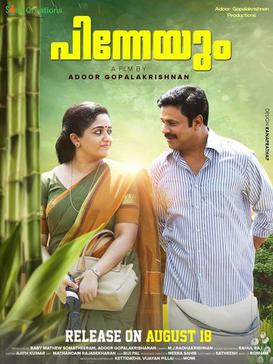
Pinneyum is a 2016 Indian Malayalam-language Biographical crime thriller film written, co-produced, and directed by Adoor Gopalakrishnan. Businessman Baby Mathew Somatheeram co-produced the film. The film portrays a love story where Dileep and Kavya Madhavan star in the lead roles. This film was loosely adapted from the murder incident in Kerala during 1984 by Sukumara Kurup, a wanted criminal.















